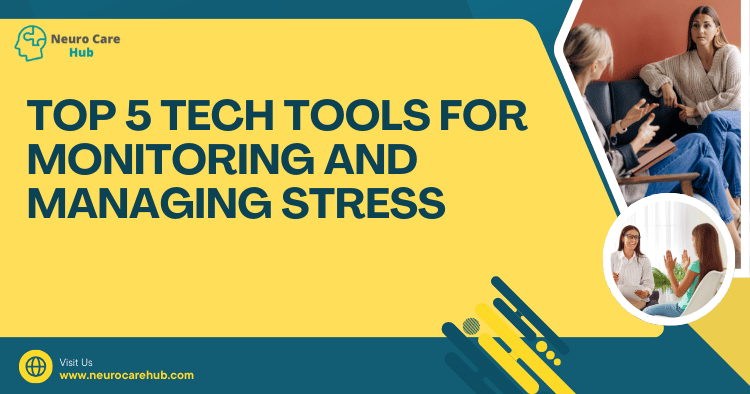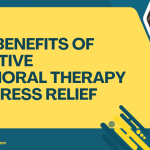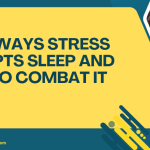- Introduction
- Wearable Devices
- Mobile Applications
- Online Therapy Platforms
- Biofeedback Devices
- Virtual Reality (VR) Stress Relief
- Conclusion
- FAQs
Introduction
In our fast-paced world, stress has become an all-too-common companion. Whether it’s due to work pressures, personal commitments, or external factors, managing stress effectively is crucial for our overall well-being. Thankfully, technology has stepped in to help us monitor and manage stress levels like never before. From wearables to mobile apps, the options are plentiful. In this article, we’ll explore the top five tech tools that can help you keep stress in check and promote a more balanced lifestyle.
1. Wearable Devices
Wearable devices, such as smartwatches and fitness trackers, have gained immense popularity for their ability to monitor physical health. However, they are also fantastic tools for tracking stress levels.
Features to Look For:
- Heart Rate Variability (HRV): Many wearables measure HRV, which can indicate how well your body is handling stress.
- Sleep Tracking: Quality sleep is vital for stress management. Wearable devices often track sleep patterns, helping identify stress-related sleep disturbances.
- Activity Levels: Regular physical activity can mitigate stress. Wearables encourage movement, reminding users to stay active throughout the day.
Popular Options:
| Device | Key Features | Average Price |
|---|---|---|
| Apple Watch | HRV, sleep tracking, activity rings | $399 |
| Fitbit Charge | Stress management tools, sleep insights | $149.95 |
| Garmin Venu | Stress tracking, pulse ox sensor | $349.99 |
For more information on how wearables can help manage stress, check out Healthline’s guide on fitness trackers.
2. Mobile Applications
Mobile apps have revolutionized the way we approach stress management. With a variety of features, these apps can guide users through mindfulness exercises, track their mood, and provide resources for coping with stress.
Recommended Apps:
- Headspace: This app offers a range of guided meditations and mindfulness exercises tailored to reduce stress and anxiety.
- Calm: Focused on sleep and relaxation, Calm provides soothing sounds, guided meditations, and sleep stories to help you unwind.
- Moodfit: This app includes mood tracking, journaling, and exercises that promote mental well-being.
Benefits:
- Accessibility: Available on your smartphone, you can access them anywhere and anytime.
- Customization: Many apps allow you to tailor the experience to your personal preferences and needs.
For a comprehensive overview of the best stress management apps, visit PCMag’s review.
3. Online Therapy Platforms
Sometimes, talking to a professional is the best way to manage stress. Online therapy platforms have made mental health support more accessible than ever.
Key Features:
- Convenience: Schedule appointments that fit your lifestyle, whether it’s through video calls or messaging.
- Variety of Therapists: Users can choose from various licensed professionals with different specialties.
Popular Platforms:
| Platform | Key Features | Starting Price |
|---|---|---|
| BetterHelp | Unlimited messaging & sessions | $60/week |
| Talkspace | Therapy via text, audio, video | $65/week |
| 7 Cups | Peer support & therapy | Free & paid options |
For more information on online therapy, check out Psychology Today’s directory.
Also look for insights on how family support enhances neuro recovery in this article.
4. Biofeedback Devices
Biofeedback devices provide real-time data about your body’s physiological responses, such as heart rate, muscle tension, and skin temperature. By becoming aware of these responses, you can learn to control them, reducing stress.
How It Works:
- Real-Time Feedback: These devices use sensors to measure your body’s responses and display them on a screen, helping you become more aware of your stress triggers.
- Training Programs: Many biofeedback devices offer guided training to help you learn relaxation techniques based on your biofeedback data.
Popular Devices:
| Device | Key Features | Average Price |
|---|---|---|
| Muse | EEG headband for meditation | $249 |
| HeartMath EmWave | HRV biofeedback device | $199 |
| Spire | Breathing monitor & stress tracker | $99 |
For an in-depth look at biofeedback, refer to The Association for Applied Psychophysiology and Biofeedback.
5. Virtual Reality (VR) Stress Relief
VR technology is not just for gaming; it has found its way into stress management. Virtual reality can transport users to calming environments, providing a unique way to relax and reduce stress.
Benefits of VR for Stress Relief:
- Immersion: VR creates a fully immersive experience, allowing users to escape from their daily stressors.
- Guided Relaxation: Many VR apps provide guided meditations and relaxation exercises set in serene virtual environments.
Recommended VR Apps:
| App Name | Features | Platform |
|---|---|---|
| Oculus Relax | Calming environments, guided relaxation | Oculus Rift |
| Guided Meditation VR | Various relaxation scenarios & sessions | Oculus, HTC Vive |
| Nature Treks VR | Explore nature while practicing mindfulness | Oculus, HTC Vive |
For more insights into the benefits of VR for stress relief, check out Harvard Health’s article.
Conclusion
With technology advancing at a rapid pace, managing stress has never been as accessible or effective. Whether you prefer wearables, mobile apps, online therapy, biofeedback devices, or immersive virtual reality experiences, there’s a tool out there that can cater to your needs. By integrating these tech tools into your daily routine, you can take proactive steps toward a more balanced, stress-free life.
FAQs
Q: Can technology replace traditional stress management techniques?
A: While technology is a helpful tool, it shouldn’t replace traditional methods like exercise, meditation, or professional therapy. Instead, think of it as a complementary approach.
Q: Are these tech tools suitable for everyone?
A: Most tech tools are designed for a wide audience. However, it’s essential to choose tools that align with your personal preferences and comfort level.
Q: How do I know if I need professional help for stress?
A: If stress significantly impacts your daily life—such as affecting your sleep, relationships, or work performance—consider seeking professional support.
By exploring these five tech tools, you’re taking a positive step toward better stress management. Remember, finding what works best for you is key, so don’t hesitate to experiment with these options! For more related insights, check out the importance of regular check-ups for health.






